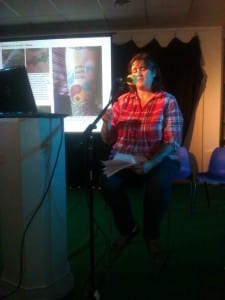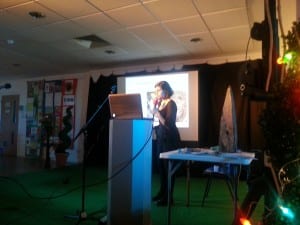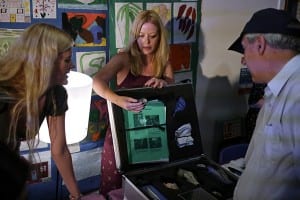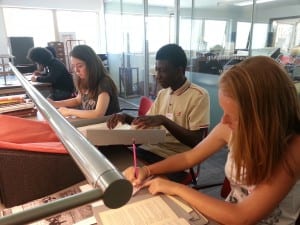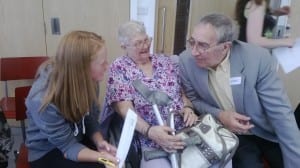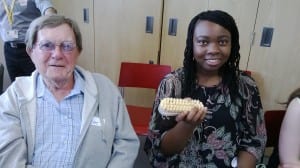‘Archaeologies of the Mind’ at the Dragon Cafe
By Anna Sexton, on 20 August 2013
Led by Dr Beverley Butler (Institute of Archaeology, UCL) we have spend three Monday evenings with Mental Fight Club at the Dragon Cafe collaboratively exploring heritage, archives and archaeology in a series of interactive sessions which we called ‘Archaeologies of the Mind’. The Dragon Cafe is a wonderful initiative that meets in the crypt of St George’s Church opposite Borough tube station every Monday. It is open to all and has a packed programme of activities and events revolving around the cafe itself. We were involved as part of the MFC’s ‘Spirit of Southwark’ project and the aim of our evenings was to open up avenues for reflection on aspects of individual and collective heritage with those that gathered.
29 July: Archaeologies of the Mind
Our evenings kicked off with an introduction by Beverley Butler who opened up a series of questions and themes for consideration. Beverley talked about her own research into aspects of heritage and wellbeing, using her own fieldwork around Jerusalem syndrome as a focal point. Beverley shared examples of New Jerusalem from Blake’s poetry to the opening ceremony of the 2012 olympic games for the audience to reflect on. This was followed by a talk by Marion Stone from the Freud Museum that raised some interesting questions around curatorial intervention in representations of the past. Marion also shared the objects of significance that Freud kept on his desk which can be interpreted in various ways. Prior to this session, the Dragon Cafe members had been invited to bring their own object of significance to share with the group. It was fascinating to hear participants speak about the significance and meaning of the objects they had brought with them which ranged from Thames foreshore finds, to an ornamental lighthouse to a personal friend. We were struck by the depth of the auto analysis that came from those that brought objects.

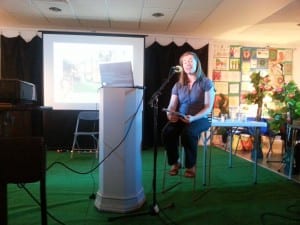
5 August: Archives and Recovery
This week focused in on the creation of archives using the mental health recovery archive at the Wellcome Library as a starting point for thinking about how mental health is represented in public histories. I spoke about the institutional context for creating the recovery archive and the impetus to balance the voice of the mental health professional expert with that of the individual with lived experience. This was followed by an excellent exploration by Dolly Sen who has contributed to the archive. Dolly shared her reflections on why she felt the archive was important and how she has represented aspects of her story within the archive. The discussion with the audience focused on the issue of framing the archive around the theme of ‘recovery’ and the connotations that the label brings with it. The audience contributed many insights into how they would choose to represent their own stories including the idea of mental health metamorphosis as a non pejorative alternative to recovery. We also reflected on the role of archivists and how we are moving from passive keepers to social activists.
12 August: Visions of Archaeology
Our final session fell on Blake’s death day so it was fitting to start the evening with a talk about Blake’s grave by Robin Hatton-Gore. Following on from this Paul Montgomery (IoA, UCL) introduced ideas around the archaeological imagination focusing on representations of archaeology in literature and popular culture. Tina then gave a very informative talk that set the archaeological process in context before focusing on the archaeology of St George’s Church itself. The talks opened up discussion around the concept of standing upon layers of the past and in particular people’s graves; this led into a reflection on the ethics of excavating human remains and of archaeology as a destructive process; as well as a discussion around the feelings and connections people have to places.
The final part of the evening sought to introduce the audience to the collections held by UCL museums through object handling. Objects from various Museums and Collections, including the Petrie Museum of Egyptian Archaeology (http://www.ucl.ac.uk/museums/petrie), the Grant Museum of Zoology (http://www.ucl.ac.uk/museums/zoology), collections from the Department of Anthropology and finds from the Thames foreshore from the Thames Discovery Programme (http://www.thamesdiscovery.org/) were brought in for participants to handle and discuss with us, giving people an opportunity to explore their own interpretations of these items and how archaeologists analyse and interpret them.
Opening up discussion and dialogue with the Dragon Cafe audience has been fantastic for the Dig Where We Stand Team and we have learnt a lot from the whole experience. Our thanks go to Mental Fight Club for welcoming us, and being so open to sharing ideas around heritage with us. Special thanks to Sarah and Declan for co-ordinating and facilitating it all so wonderfully. Photos and podcasts from the evenings can be found on the dragon cafe website: www.dragoncafe.co.uk
 Close
Close



